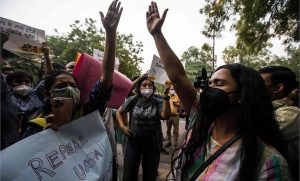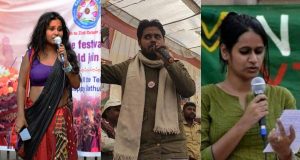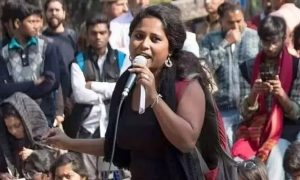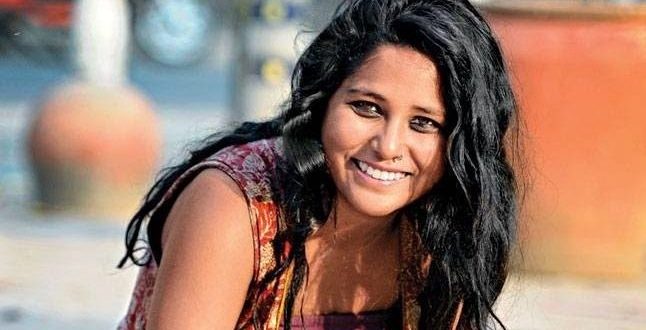30-06-2021
Bureau Report + Agencies
NEW DELHI: When student activists Devangana Kalita and Natasha Narwal walked out of Delhi’s Tihar jail recently, it was obvious their 13-month stint in prison had failed to dim their morale.
With wide smiles and fists raised in defiance, the founders of Pinjra Tod (Break the Cage) were welcomed by friends and family with cheers and chants.
Two weeks since their release on bail, they tell media that they are “still adjusting to this new reality” and their fight to make the world a better, more inclusive place will continue.
I met Natasha and Devangana in October 2015 when I covered their first protest – a defiant night walk around Delhi University colleges.
 Pinjra Tod was created to fight misogyny and discriminatory rules on college campuses hostels for female students were locked up at dusk while male students rarely had curfew timings. Over time, the movement resulted in many hostels easing restrictions for female students.
Pinjra Tod was created to fight misogyny and discriminatory rules on college campuses hostels for female students were locked up at dusk while male students rarely had curfew timings. Over time, the movement resulted in many hostels easing restrictions for female students.
The “irony” of their arrest, Devangana said, was not lost on them.
“We spent years fighting for our right to break the cage. Now imagine the absurdity of the situation that we landed up in the biggest cage with the biggest lock that there possibly could be,” she said.
The two were arrested on 23 May last year with the police accusing them of being the “masterminds” of the Delhi riots in which 53 people died.
They were charged – along with several other students and activists – under the Unlawful Activities Prevention Act (UAPA), a draconian anti-terrorism law which makes it nearly impossible to get bail.
Devangana and Natasha denied the accusations and said they had only participated in peaceful protests against a controversial citizenship law that is discriminatory towards Muslims.
International rights groups such as Amnesty, Human Rights Watch and Frontline Defenders criticized their arrests and accused Prime Minister Narendra Modi’s Hindu nationalist government of cracking down on dissent.
While ordering their release, the Delhi high court also criticized the government for “confusing the right to protest with terrorist activity”. Police have appealed against the order in the Supreme Court.
 On 28 May 2020 when they were first taken to Tihar, Natasha said they felt relief.
On 28 May 2020 when they were first taken to Tihar, Natasha said they felt relief.
“After five days of grueling questioning by the police, we were relieved that finally no-one was shouting at us, accusing us of things we hadn’t done. It felt very peaceful”, but as days passed, Devangana said they realized that “jail is an everyday battle for survival – physical, mental and emotional”.
“Jail is a dehumanizing, destabilizing, brutal place. And during the pandemic, it reached a whole different level. In normal times, there would be family visits and they would bring you clothes and books, “but we were arrested and locked up as India was in the midst of the Covid-19 pandemic. Family visits were stopped and the sense of isolation was devastating. It was like being in a coffin – we couldn’t get away and no outside voice could reach us”, and with courts shut, prison staff could operate with impunity, increasing the vulnerability of prisoners, Natasha said.
“We were lucky, we had access to good lawyers and our case had media attention. But most prisoners are from marginalized sections, many of them have little education and no access to lawyers. And officials have absolute power over their lives and they don’t treat them as human beings.”
Indian prisons can be tough places, and in recent months, jail authorities have been criticized for being especially cruel to the government’s critics.
Safoora Zargar, a pregnant student activist who also did time in Tihar last year in connection with the Delhi riots, told me after her release that for every little thing, inmates had to beg or depend on the kindness of others.
Prisoners had to write applications – a difficult task for those unable to read and write – for basic amenities.
To help them, Devangana and Natasha started writing their applications – for clothes, slippers and to be allowed to call home.
 As days turned into weeks and months, Devangana and Natasha said their hopes for an early release dimmed.
As days turned into weeks and months, Devangana and Natasha said their hopes for an early release dimmed.
“We’d read about people charged under UAPA being released after eight-10 years in prison and we knew it could happen to us,” Devanaga said.
As they floated between hope and despair, they found meaning in their immediate surroundings.
“Since we were cut off from the outside world and couldn’t meet our families, we ended up building intense friendships in prison,” Natasha said.
“We were in a ward where there were children, many of them were born in prison, and it was heartening to see many of them being brought up collectively.
“It’s not that there were no conflicts and fights, but there was also a sense of being in it together. Women were always braiding each other’s hair, we played ludo [a popular board game], we learnt so many different ways of braiding hair,” she said, laughing.
Added Devangana: “And when there were difficult days, when we would be gripped by despair and uncertainty, our fellow inmates would try and build us up. ‘Don’t lose heart,’ they’d say. ‘Thousands are praying for your release.’ And that would make us feel better”, but the manner of their release has left them bitter.
“Around 5:30pm, the staff came and started locking everyone up in their wards. We were told to pack up and leave. We were not allowed to meet anyone, to hug any of our friends. It was a very painful separation, they snatched away our last goodbyes,” Natasha said.
Two weeks later, as they spoke media about their time in prison, Devangana said she was still “finding it hard to believe that we are out”, that her “dreams are still peopled by our fellow inmates” and that she knew they could be sent back to prison again but for the moment, Natasha said, “we are happy to be free”.
“Immediately at dusk, we’d be locked up. Not being able to see the moon, the stars and the night sky was really difficult. We still haven’t had our fill of watching the sky.”
 Pressmediaofindia
Pressmediaofindia




